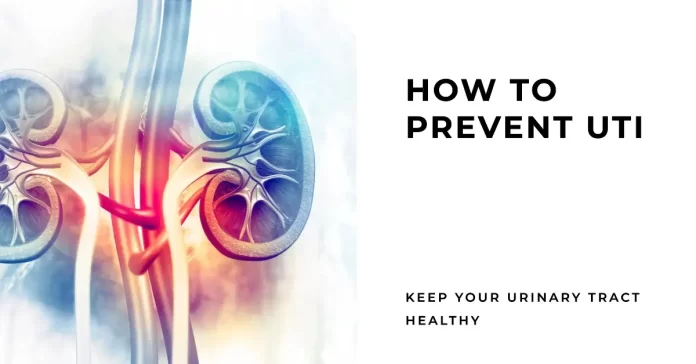Urinary tract infections (UTIs) can be painful and bothersome, but they are often preventable with the measures. This article serves as a comprehensive guide to help individuals understand and implement strategies for UTI prevention. From lifestyle adjustments to hygiene practices, discover practical steps to maintain optimal urinary health and reduce the risk of UTIs.
Here are ten tips to help prevent urinary tract infections (UTIs)
Stay hydrated
Keeping well-hydrated is crucial for maintaining excellent health and well-being. Drinking water throughout the day helps ensure that your body functions properly, aids digestion, regulates body temperature, and supports various physiological processes. By prioritizing hydration, you can promote overall wellness and help prevent common health issues associated with dehydration. It promotes urine flow, which helps flush out bacteria from the urinary tract and reduces the risk of urinary tract infections (UTIs). Additionally, staying well-hydrated aids in toxin elimination, regulation of body temperature, and the optimal functioning of vital organs.Urinate regularly
Don’t hold urine for extended periods; empty your bladder regularly to prevent the growth of bacteria. Emptying your bladder is essential for maintaining urinary health and reducing the risk of urinary tract infections. Avoid holding in urine for long periods, as it can allow bacteria to multiply in the urinary tract and lead to potential complications.Practice good hygiene
Wipe from front to back after using the toilet to avoid transferring bacteria from the anal area to the urethra. Maintaining good hygiene practices is essential for promoting overall health and preventing infections. It includes regular handwashing with soap and water, proper dental care, and maintaining cleanliness in personal and shared spaces. You can significantly reduce the risk of illness and maintain a healthier lifestyle by prioritizing good hygiene.Urinate before and after sexual activity
Emptying your bladder before and after sexual intercourse helps flush out bacteria that may have entered the urethra. Urinating before and after sexual activity is recommended to help prevent urinary tract infections (UTIs). Emptying your bladder before sexual activity helps to flush out any bacteria that may be present in the urethra while urinating afterward can help eliminate any bacteria that may have entered the urinary tract during intercourse. This simple habit can reduce the risk of UTIs and promote urinary health.Wear breathable underwear
Opt for cotton underwear and avoid tight-fitting clothing that can trap moisture, creating an ideal environment for bacterial growth. Opting for breathable underwear allows for better air circulation and moisture absorption, reducing the risk of bacterial growth and maintaining better genital hygiene. Breathable underwear helps to keep the genital area dry and reduces the likelihood of irritation, discomfort, and potential infections.Avoid irritating feminine products
Steer clear of harsh soaps, douches, and sprays that can disrupt the natural balance of bacteria in the genital area. It is advisable to avoid using harsh soaps, douches, and sprinkles in the genital area as they can disrupt the natural balance of bacteria and irritate sensitive tissues. Opting for gentle, fragrance-free products specifically for intimate hygiene helps maintain the natural pH balance and reduces the risk of irritation or infection. It is crucial to prioritize gentle and non-irritating feminine care products to promote overall genital health.Practice proper catheter care
If you require a urinary catheter, ensure it is inserted and maintained correctly, following proper hygiene protocols to minimize the risk of infection. Practicing catheter care is crucial to lessen the risk of urinary tract infections (UTIs) and other complications. It involves following strict hygiene protocols, such as washing hands thoroughly before and after handling the catheter, ensuring proper insertion and maintenance techniques, and regularly cleaning and disinfecting the catheter site as per healthcare provider guidelines.Maintain a healthy diet
Eat a balanced diet rich in fruits, vegetables, and whole grains to support overall immune health and reduce the risk of UTIs. Maintaining a healthy diet is vital for overall well-being, including urinary health. A diet rich in fruits, vegetables, whole grains, lean proteins, and adequate hydration supports a secure immune system and helps prevent urinary tract infections. Limiting processed foods, excessive sugar, and caffeine intake can also contribute to maintaining a healthy urinary system.Avoid holding in urine
Responding promptly to the urge to urinate and emptying your bladder is essential for maintaining a healthy urinary system. Holding in urine for long periods can increase the risk of bacterial growth in the urinary tract, potentially leading to Urinary Tract Infections. By avoiding the habit of holding in urine and promptly responding to the urge to urinate, you can help prevent complications and promote optimal urinary health.Consider cranberry products
Some studies suggest that cranberry juice or supplements may help reduce the risk of UTIs by preventing bacteria from adhering to the urinary tract walls. Consult a healthcare professional for guidance on incorporating cranberry products into your routine. Including cranberry products in your procedure may offer benefits for urinary tract health. Some studies suggest that cranberry juice or supplements may help prevent bacterial adherence to the urinary tract walls, reducing the risk of urinary tract infections (UTIs). However, it’s crucial to consult a healthcare professional for personalized advice and guidance on incorporating cranberry products into your diet, as individual needs and medical conditions can vary.
Common symptoms of a urinary tract infection (UTI) may include
- Frequent urge to urinate: Feeling the need to urinate more often than usual or experiencing a constant desire to urinate.
- Pain or burning sensation during urination: Discomfort, stinging, or burning sensation while passing urine.
- Cloudy or bloody urine: Urine may appear cloudy, dark, or have a reddish tinge, indicating the presence of blood.
- Strong-smelling urine: Urine may have a strong, unpleasant odor that is different from the usual.
- Lower abdominal pain or discomfort: Lower abdominal pain or discomfort may occur, characterized by dull or persistent pain in the lower abdomen.
- Pelvic pain in women: Women may experience pelvic pain, often around the pubic bone area.
- Fatigue or general malaise: Experiencing fatigue or general malaise is characterized by feelings of tiredness, weakness, or a general sense of unwellness. Getting medical attention is vital for obtaining an accurate diagnosis and receiving proper treatment for a UTI.
Note: It is important to note that not everyone may experience all of these symptoms, and the severity can vary. If you suspect you have a UTI, consulting with a healthcare professional is recommended for the proper diagnosis and treatment of a UTI.
Here are six common Myths about urinary tract infections (UTIs)
- Myth: Drinking cranberry juice can cure a UTI.
Fact: While cranberry products may have some preventive properties, they cannot cure an existing UTI. Medical treatment, such as antibiotics, is necessary to treat a UTI. - Myth: UTIs only affect women.
Fact: Although UTIs are more common in women due to their shorter urethra, men can also develop UTIs. Factors such as age, sexual activity, and underlying health conditions can increase the risk in both genders. - Myth: Poor hygiene can always contribute to the origin of UTIs.
Fact: Poor hygiene, sexual activity, urinary tract abnormalities, suppressed immune systems, and catheter use can all cause UTIs. Proper hygiene is crucial, but it is just one aspect of prevention. - Myth: Drinking more water can cure a UTI.
Fact: Increasing water intake can help flush out bacteria and may provide some relief, but it is not a cure for a UTI. Antibiotics prescribed by a healthcare professional are necessary to treat the infection. - Myth: UTIs are not serious and will go away on their own.
Fact: UTIs should not be left untreated, as they can lead to more severe complications if bacteria spread to the kidneys. Seeking medical attention is crucial for receiving proper diagnosis and treatment. - Myth: Eating foods with too much salt can directly cause UTIs.
Fact: Eating foods with high salt content does not directly cause UTIs. UTIs primarily occur when bacteria enter the urinary tract. However, excessive salt intake can contribute to dehydration, indirectly increasing the risk of UTIs.
Conclusion
You can significantly reduce the likelihood of experiencing UTIs by adopting a proactive approach and incorporating preventive measures into your daily routine. Remember to stay hydrated, maintain good hygiene, practice safe bathroom habits, and seek medical advice when needed. With these precautions, you can take charge of your urinary health and enjoy a life free from the discomfort of UTIs.










